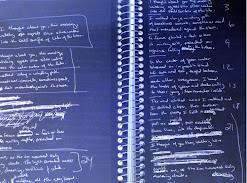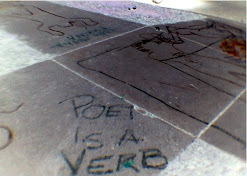Here are some discussion questions for this week's Poetry Book Club book. I'm still in the middle of it, so I will be posting my answers either later tonight or tomorrow. I'll also try to add some reviews by other authors in my own comments. I look forward to everyone's responses.
Discussion Questions
Overall, did you like the book? What about it did you like?
Were there specific poems that spoke to you? Which ones? Why?
Was there anything that confused you about the overall book? What was it?
Were there any individual poems that confused you?
What would you say is the overall theme of the book? Which poems best carried out that theme?
How would you describe the author's style? How did he use language to convey images, ideas, or voice?
Thursday, June 21, 2007
Poetry Book Club-- Horse Latitudes by Paul Muldoon
Posted by Jessica at 5:22 PM
Labels: poetry book club
Subscribe to:
Post Comments (Atom)



7 Comments:
Thanks for the question prompts, Jessica.
I think I’ll start with my general impressions and go from there.
I had a tough time getting started with the book. I found it complicated and confusing. I even felt stupid, dense. The language was sometimes extraordinarily unusual. (And thought I am not incredibly well read I usually feel my vocabulary is fairly developed.) I couldn’t tell if these troublesome words were foreign (he is Irish), fantasy (and a skilled poet) or just obtuse (maybe this is the so-called sophisticated part—perhaps it’s not for me). I wasn’t sure I was going to be able to get into it enough to get through it.
Then, seemingly all of a sudden, I stopped worrying about what the words and poems meant and was startled by the sound and shape themselves. I must have looked a little crazy mouthing words to myself (quietly) riding the bus to and from work.
I loved the repetition and phrasing, the line structure and shape. I liked the forms. And a few of the poems actually made sense. Not all of them, to be sure. It’s true I liked some more than others. But I felt affection for the book. A very different perspective was mine at the end of the reading than the beginning.
It took some time, nearly all of the month plus. Sometimes I had to set it aside and pick it up at another place (not the pages, but me being in another place). But I do think I had to read a bit to start being able to hear the tenor of the voice. And that the book as a volume has shape, though I can’t tell you what it is exactly.
My very favorite (I think) is The Old Country. And Turkey Buzzards, and The Coyote. But I also liked the one about the dog, Now Pitching Himself Like A Forlorn Hope (This has got to be my favorite title ever.) I don’t know the answer to the Riddle.
I don’t know forms. I would have to get my books out and do a schoolgirl’s matching. But I like many of them. I am completely enamored with the word play and repetition.
Seems he is weaving his life and his times back and forth.
I'd love to chat this one through. I may be slow to resond with work and houseguests taking most of my time at the present.
Thank you for your very astute observations! I'm so glad that you're so committed to the books that we read.
I'm so glad that I'm not the only one who is struggling with this book. The first poem (or series), "Horse Latitudes", is incredibly difficult to decipher. It's as if he is vascillating between present time and historical time, or personal history and cultural history. It was such a weird and disconcerting beginning to this book.
I think my biggest struggle with this book is his language. At times, it feels like Muldoon is being intentionally obscure, like the "90 text messages to Tom Moore" poem, which is actually all rhymed haiku. Here is a biography of Tom Moore, in case you're interested. I haven't read it yet, but I'm hoping it will help with the poem.
That being said, I did love his language use. If you read his poems aloud, as I did after "Horse Latitudes," you can really hear his meter and his grasp of language. He also uses such creative langauge -- I kept thinking to myself that I do not use enough creative words.
I think my favorite poem so far is "The Old Country," because even though it is obscure, it still conjures an image. I also like "At Least They Weren't Speaking French," because of the repetition. And "Eggs" is just beautiful and strange.
I can't tell if I like this book or not yet. It's taken me so long to read it (and I'm a fast reader) and I feel like it's a really big meal that I need to digest.
I'll post more later... but here is another question to ponder...
Do we think he is being intentionally obscure or is there a method to his obscure references? Also, who's responsibility is it for clarity in allusions, the author or the readers?
Thanks again for your comments, deb!
Looking at other reviewers’ insights is a good idea.
I had noticed that Horse Latitudes poems all started with “B” and that they all included equines. But it makes me feel a little less stupid when others admit to confusion and difficulty. (I am glad we are able to be candid, here! To have the book start with those poems was daunting.)
I found one blog-review yesterday, Jason Gray’s Line Art here: http://jason-gray.blogspot.com/2006/11/paul-muldoons-horse-latitudes.html, and another today, from The Guardian: http://books.guardian.co.uk/review/story/0,,1927298,00.html, “A Poke in the Eye with a Poem”, by James Fenton written last fall.
As to your questions, “Do we think he is being intentionally obscure or is there a method to his obscure references?”
I think Muldoon’s own words quoted in Fenton’s article helped me answer that. He is indeed taking us for a ride. He knows there’s a faster, more direct route, but that wouldn’t allow the reader to explore his (own) thoughts as completely. (I’d like a little more help from time to time, though. A guidebook, for instance!)
“Also, who's responsibility is it for clarity in allusions, the author or the readers?”
Interesting question. Seems it must be a conversation. My romantic-fantasy eye sees a poem unfurl off the page as a magical desiccated flower renewed by fresh air or a drop of spit. Poems in particular transform themselves with the reading of a particular reader. Some will find more than the poet intended, some less, and a few might take it just as intended. There must be space for all in a poem. (I’m not normally so frothy, don’t worry.)
And thanks to you, too, for digging in. I don't think I would have perservered without a June 21st post date to engage me. It's like getting up in the morning to go walking with a friend. Even when it's dark and cold...the buddy-system pushes me on. (Unless it's raining!)
The Jason Gray link is bad...but if you go to the "home" then look in the year/date of the link, you'll find it. (Nice blog, too, it seems.)
He links to a reviewer of some insight, which I intend to read very soon.
The Guardian article was quite good.
I wrote this link before dinner, but mean Blogger wouldn't let me post it. So please excuse the dinner references. We had chicken tamales. They were delicious.
Thank you for the link to Jason Gray's blog and the Guardian Article. Gray also has a link to a new republic article, but you cannot access it unless you subscribe.
The Guardian article includes two quotes by Muldoon that I think really illuminate his stylistic choices:
1) "If the poem has no obvious destination, there's a chance that we'll all be setting off on an interesting ride."
I wonder, when writing, if he knows where he's going and he's choosing to lead us in a circuitous route or if he realizes where he's going while he's writing, but leaves the thought process for us, like a trail of bread crumbs. My advisors in grad school always cautioned me against knowing too much about the poem, before I write it, because there's no discovery for the reader or the writer.
2) "The point of poetry is to be acutely discomforting, to prod and provoke, to poke us in the eye, to punch us in the nose, to knock us off our feet, to take our breath away."
So that discomfort we both felt at the beginning of the book, reading the 19 sonnnets about battles that start with B that include horses, but that doesn't include Bagdad, is totally intentional.
Btw, this explanation for the Horse Latitudes series seems like an awfully big stretch. He is expecting alot of his readers, for us to make that connection. Or he could be being purposefully obscure. I wonder how many people came to that realization while reading it. I feel like my students right now, complaining about the author's obscure connections. :O
In order to continue the link parade we have going here, is a link to Muldoon's personal website. He has a page that links to recordings of him reading his poems. It takes awhile to load, even on a high speed connection, but it's worth it. It's really endearing to hear him reading them, with his very buried Irish brogue. More like a lilt, really. I thought that the poems would play better when he reads them, and it's true.
He also is a musician, which seems apt, considering his ear for rhythym and form.
One thing that I wanted to mention was that it seems like he is in the same artistic vein as Lewis Carroll and e.e. cummings. There's a sense of playfullness in the language that I think Carroll, cummings, and Muldoon all possess. But with that playfullness, comes a lack of intimacy. Even though the reviews say his work is personal and intimate, I had a hard time finding that in this book.
I have to go, because dinner's ready. But thank you, deb, for embarking on this journey with me. I agree that I would never have made it through this book without the pressure of the deadline, but I'm glad I did.
hi deb and jessica,
thanks for such a thorough review, i tried and got nowhere and got frustrated. but i still have the library copy on my desk and after reading your thoughts i will give it another go.
it does make me thikn of a professor in college who told of (in her grad school days) being assigned reading that included several pages of the same word repeated over and over. she and all the other students skipped it and their teacher said they had completely missed the point which was to experience what you heard amidst the monotony.
so. i'm going to try again, and this time i'll read them out loud.
I love your story about your college professor -- I too would have skipped the pages and totally missed the point. :)
I think it's great that you're going to give Muldoon another "college try" (couldn't resist). He is worth the effort, I think, even if it is maddenning and difficult. Good luck and let me know how the second attempt goes.
Post a Comment